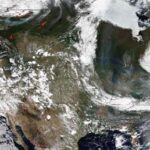Under the new Mid-Atlantic Coastal Resiliency Institute (MACRI), nine agencies and universities have agreed to partner together to help local and regional leaders make coastal communities more resilient to climate change.
Addressing the coastline extending from New York City to Virginia Beach, contributing agencies include NASA’s Goddard Space Flight Center, U.S. Fish and Wildlife Service, U.S. Geologic Survey, Chincoteague Bay Field Station of the Marine Science Consortium, College of William and Mary, University of Virginia, The Nature Conservancy, University of Delaware and University of Maryland (UMD).
“At ESSIC we are very pleased to join with our colleagues at NASA Wallops and such a strong set of regional partners to tackle the challenges of resiliency in the mid-Atlantic,” said Antonio Busalacchi, Director of UMD’s Earth System Science Interdisciplinary Center (ESSIC) and Chair for the Council on the Environment (ConE).
“Wallops is situated in a unique location with an equally unique set of observational resources that can be used to benefit the citizens of the region,” said Busalacchi, who is also a professor in the Department of Atmospheric and Oceanic Sciences at the University of Maryland. “We look forward to potential opportunities to collaborate under MACRI.”
The official agreement among the agencies was signed into effect on June 9, 2014 at NASA’s Wallops Flight Facility in Wallops Island, Virginia.






